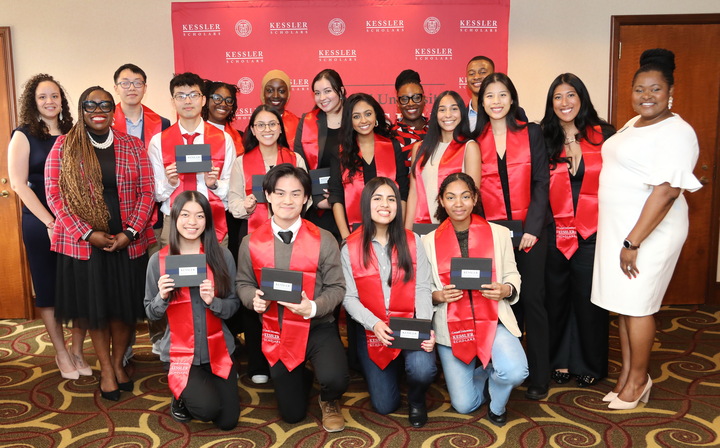The Kessler Scholars Program is a comprehensive, cohort-based program designed to support first-generation, limited-income college students through a combination of financial aid and robust, evidence-informed support programming. Established and emerging Kessler Scholars Programs are embedded in and supported by the Kessler Scholars Collaborative, a nationwide network that guides program development and implementation, facilitates practice sharing across institutions, and provides students with opportunities to connect with other first-generation scholars across the country.

2024 Cornell Kessler Scholars Stole Ceremony. Photo credit: Roger William Photography for Cornell University
The Kessler Scholars Collaborative was formed in 2020 to support program development at six inaugural institutions: Cornell University, Johns Hopkins University, Queens College, St. Francis College, Syracuse University, and the University of Michigan, where the first Kessler Scholars Program was established in 2008. In April 2022, ten additional institutions were selected to join the Kessler Scholars Collaborative as part of a new partnership with the American Talent Initiative (ATI), with generous funding support from Bloomberg Philanthropies and the Judy and Fred Wilpon Family Foundation. The American Talent Initiative is a coalition of public and private institutions with high graduation rates that are committed to expanding college enrollment and success for low- and moderate-income college students. ATI is co-managed by Ithaka S+R and the Aspen Institute College Excellence Program.
Ithaka S+R began serving as the external evaluation partner for the Collaborative in 2022. The primary aim of the five-year formative assessment of the program is to support implementation and maximize impact across the entire network and at each of the 16 participating institutions. On this page, we’ll share updates about our findings and the Collaborative’s impact.
2022-2023 Evaluation Outputs
Ithaka S+R’s formative evaluation during the 2022-23 academic year focused on assessing the effectiveness of the Collaborative’s support to its network of institutions, learning about program implementation at inaugural institutions, and program development at new institutions, and understanding the experiences, and outcomes of participating scholars. Read an issue brief to view evaluation findings from the 2022-23 academic year and explore takeaways and key themes from the 2024 summer convening.
2023-2024 Evaluation Outputs
Ithaka S+R’s formative evaluation during the 2023-24 academic year focused on assessing the effectiveness of three targeted evidence-based interventions provided to first-year Kessler Scholars across multiple campuses—peer mentoring, first-year seminars, and summer transition programs—in addition to core program supports. Read a report to learn about the key findings from our evaluations of these interventions, and explore the perspectives of program administrators on strategies to support first-generation college students.